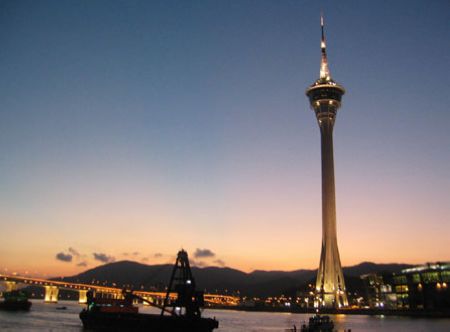Macao gambles on tourism

Macao. Size of a village, impact of a volcano. The statistics alone are mind-boggling: 13.2 percent GDP growth in 2008, making the concept of a "financial crisis" about as nonsensical as Chinese cheese. More gambling revenue even than that other Mecca of vice out in the deserts of Nevada, US. And all packed into a tiny sliver of land roughly the size of one of the smaller inner-city districts of Beijing. It is still an open question, however, whether the sin capital of the East can offer more to its hordes of tourists (again, an unfathomably huge 25 million in the first 10 months of 2008 alone) than mere kitsch and casinos.
I use the term "mere" in the most generous sense, of course. There is something grotesquely awesome about the largest casino in the world looking like a giant indoor mock-up of the Venetian canals, or the tallest bungeejumping platform on the planet right in the heart of downtown, or all the fountain shows, fire shows, and food fairs never more than a few bus stops away.
Macao doesn't seem to know what to do with all its money – aside from simply giving it away (literally: Each resident receives a few thousand patacas every year just for being alive.) They've built a plethora of monuments that have no discernible meaning, including a pair of 40-meter tall black obelisks that look like they just landed from the mothership and have since fallen into disuse and disrepair along a weed-choked beach boardwalk.
It's a bit sad then, that for all its frilly, tourist-baiting delights, Macao's gaming floors are packed to the teeth at four in the morning on Saturday, at three in the afternoon on Thursday, and every second in between. The repetitive clink and clang of the slot machines could just as easily mark the sound of another spoilt rich kid who'll go without his drinking money for the night as they could the death knell of an entire family's life savings. Not to say that the Chinese – by far Macao's largest visitor base – are more susceptible to gambling addictions than anyone else, but the sheer size and scale of the Macao casino infrastructure is unsettling in this easy money, get-rich-(andpoor)- quick era.
A glimmer of hope emerges, however, in the form of Macao's deep and rich historical legacy. As the oldest European colony in East Asia and most recently relinquished colony in the world, Macao's firm embrace of its Portuguese roots is evident citywide, from the stunning ruins of St. Paul's Cathedral to the narrow, brightly-colored cobblestone walkways criss-crossing the old neighborhoods. Add to this a diverse smattering of Asian temples and gardens, and a picture emerges of a unique and uncommon global city – one of the few that, in these over extended economic times, is still nascent enough to be less defined by its greed and excesses than the fascinating history which predated them.
 0 Comments
0 Comments







Comments